2024届高考英语复习:名词从句课件(共23张PPT)
文档属性
| 名称 | 2024届高考英语复习:名词从句课件(共23张PPT) |  | |
| 格式 | pptx | ||
| 文件大小 | 551.5KB | ||
| 资源类型 | 教案 | ||
| 版本资源 | 通用版 | ||
| 科目 | 英语 | ||
| 更新时间 | 2023-08-16 05:51:20 | ||
图片预览

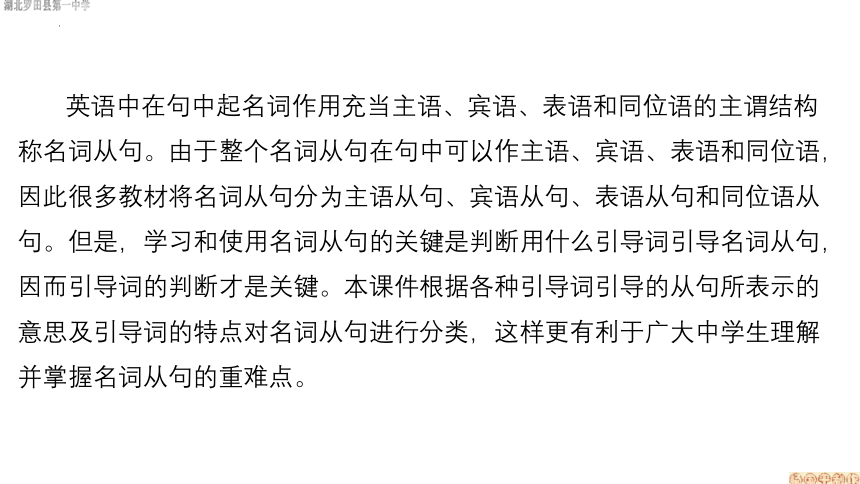
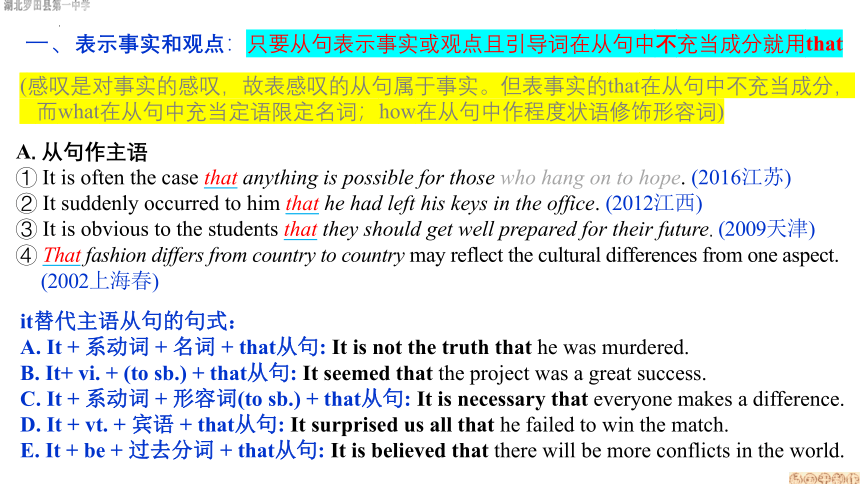
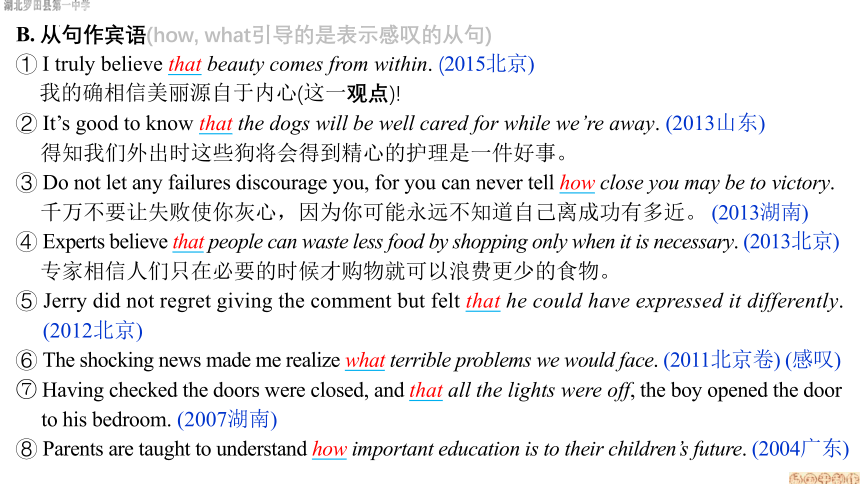

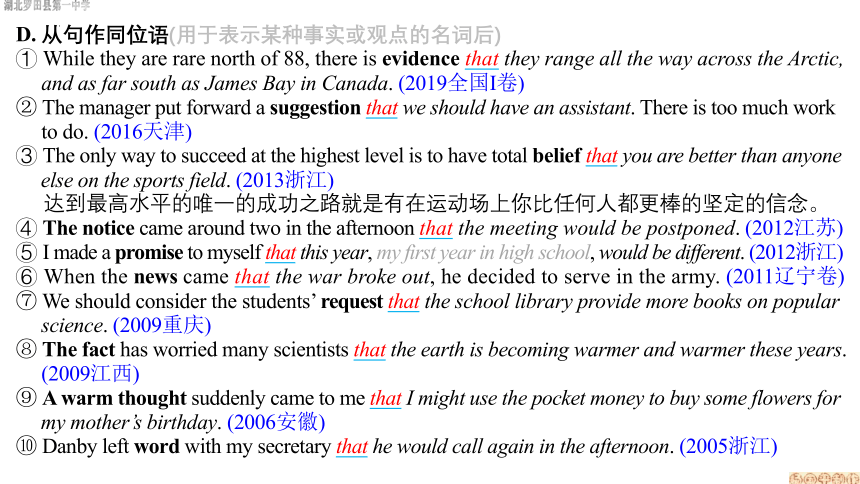
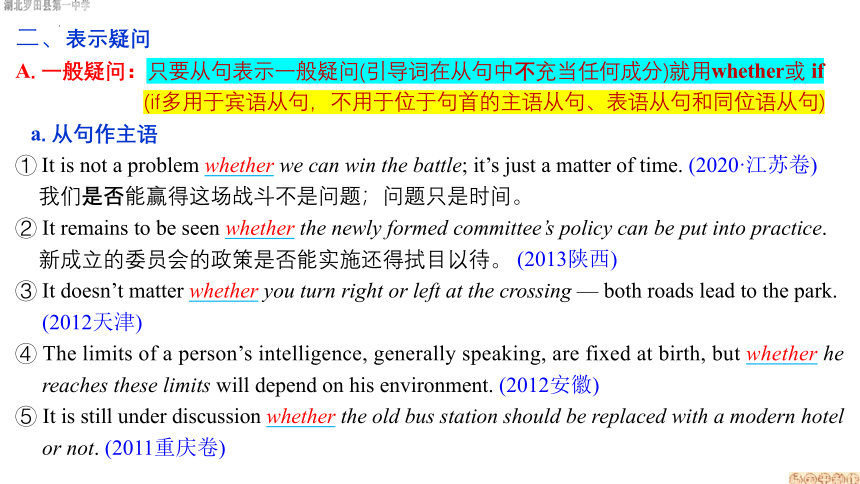

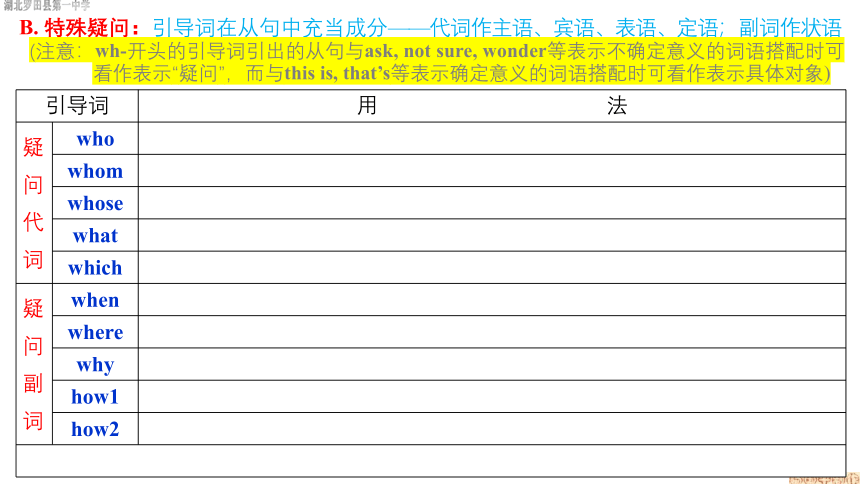
文档简介
(共23张PPT)
名词从句与高考
英语中在句中起名词作用充当主语、宾语、表语和同位语的主谓结构称名词从句。由于整个名词从句在句中可以作主语、宾语、表语和同位语,因此很多教材将名词从句分为主语从句、宾语从句、表语从句和同位语从句。但是,学习和使用名词从句的关键是判断用什么引导词引导名词从句,因而引导词的判断才是关键。本课件根据各种引导词引导的从句所表示的意思及引导词的特点对名词从句进行分类,这样更有利于广大中学生理解并掌握名词从句的重难点。
一、表示事实和观点:只要从句表示事实或观点且引导词在从句中不充当成分就用that
A. 从句作主语
① It is often the case that anything is possible for those who hang on to hope. (2016江苏)
② It suddenly occurred to him that he had left his keys in the office. (2012江西)
③ It is obvious to the students that they should get well prepared for their future. (2009天津)
④ That fashion differs from country to country may reflect the cultural differences from one aspect.
(2002上海春)
(感叹是对事实的感叹,故表感叹的从句属于事实。但表事实的that在从句中不充当成分,
而what在从句中充当定语限定名词;how在从句中作程度状语修饰形容词)
it替代主语从句的句式:
A. It + 系动词 + 名词 + that从句: It is not the truth that he was murdered.
B. It+ vi. + (to sb.) + that从句: It seemed that the project was a great success.
C. It + 系动词 + 形容词(to sb.) + that从句: It is necessary that everyone makes a difference.
D. It + vt. + 宾语 + that从句: It surprised us all that he failed to win the match.
E. It + be + 过去分词 + that从句: It is believed that there will be more conflicts in the world.
B. 从句作宾语(how, what引导的是表示感叹的从句)
① I truly believe that beauty comes from within. (2015北京)
我的确相信美丽源自于内心(这一观点)!
② It’s good to know that the dogs will be well cared for while we’re away. (2013山东)
得知我们外出时这些狗将会得到精心的护理是一件好事。
③ Do not let any failures discourage you, for you can never tell how close you may be to victory.
千万不要让失败使你灰心,因为你可能永远不知道自己离成功有多近。 (2013湖南)
④ Experts believe that people can waste less food by shopping only when it is necessary. (2013北京)
专家相信人们只在必要的时候才购物就可以浪费更少的食物。
⑤ Jerry did not regret giving the comment but felt that he could have expressed it differently.
(2012北京)
⑥ The shocking news made me realize what terrible problems we would face. (2011北京卷) (感叹)
⑦ Having checked the doors were closed, and that all the lights were off, the boy opened the door
to his bedroom. (2007湖南)
⑧ Parents are taught to understand how important education is to their children’s future. (2004广东)
C. 从句作表语
① The most pleasant thing of the rainy season is that one can be entirely free from dust. (2016北京)
雨季最令人愉悦的情况就是人可以完全不再受到沙尘的困扰(这一事实)。
② Part of the reason Charles Dickens loved his own novel, David Copperfield, was that it was rather
closely modeled on his own life. (2010北京)
查尔斯·狄更斯喜爱他自己的小说《大卫·科波菲尔》的部分原因是这本书几乎是以
他自己的真实生活为原型创作的。
③ One reason for her preference for city life is that she can have easy access to places like shops and
restaurants. (2010上海)
她更喜欢城市生活的原因之一是在城市里她容易找到像商店和餐馆这样的地方。
④ What made the school proud was that more than 90% of the students had been admitted to key
universities. (2003上海春)
使该校骄傲的是该校90%以上的学生被重点大学录取了。
D. 从句作同位语(用于表示某种事实或观点的名词后)
① While they are rare north of 88, there is evidence that they range all the way across the Arctic,
and as far south as James Bay in Canada. (2019全国I卷)
② The manager put forward a suggestion that we should have an assistant. There is too much work
to do. (2016天津)
③ The only way to succeed at the highest level is to have total belief that you are better than anyone
else on the sports field. (2013浙江)
达到最高水平的唯一的成功之路就是有在运动场上你比任何人都更棒的坚定的信念。
④ The notice came around two in the afternoon that the meeting would be postponed. (2012江苏)
⑤ I made a promise to myself that this year, my first year in high school, would be different. (2012浙江)
⑥ When the news came that the war broke out, he decided to serve in the army. (2011辽宁卷)
⑦ We should consider the students’ request that the school library provide more books on popular
science. (2009重庆)
⑧ The fact has worried many scientists that the earth is becoming warmer and warmer these years.
(2009江西)
⑨ A warm thought suddenly came to me that I might use the pocket money to buy some flowers for
my mother’s birthday. (2006安徽)
⑩ Danby left word with my secretary that he would call again in the afternoon. (2005浙江)
二、表示疑问
A. 一般疑问:只要从句表示一般疑问(引导词在从句中不充当任何成分)就用whether或 if
(if多用于宾语从句,不用于位于句首的主语从句、表语从句和同位语从句)
a. 从句作主语
① It is not a problem whether we can win the battle; it’s just a matter of time. (2020·江苏卷)
我们是否能赢得这场战斗不是问题;问题只是时间。
② It remains to be seen whether the newly formed committee’s policy can be put into practice.
新成立的委员会的政策是否能实施还得拭目以待。 (2013陕西)
③ It doesn’t matter whether you turn right or left at the crossing — both roads lead to the park.
(2012天津)
④ The limits of a person’s intelligence, generally speaking, are fixed at birth, but whether he
reaches these limits will depend on his environment. (2012安徽)
⑤ It is still under discussion whether the old bus station should be replaced with a modern hotel
or not. (2011重庆卷)
b. 从句作宾语
① Cobb, for her party, started to ask conference organizers who invited her to speak if /
whether she could do so remotely. (2022年浙江1月)
对于她的出席,Cobb开始询问邀请她演讲的组织者她是否可以远程进行演讲。
② We’ve offered her the job, but I don’t know whether she’ll accept it. (2011山东卷)
③ At first, he hated the new job but decided to give himself a few months to see if it got any
better. (2009北京)
起初他讨厌这个新工作, 但决定给自己几个月时间看看是否能感觉好点。
c. 从句作表语
① What the doctors really doubt is whether my mother will recover from the serious disease soon.
(2001上海春)
② The question remains whether they will be able to help us. 问题还是他们能否帮我们。
d. 从句作同位语 (用于表示“问题”的question等名词后)
① The student asked me the question whether the book was worth reading.
学生问了我那本书是否值得一读这一问题。
② Your question whether you’ll achieve your dream is hard to answer.
B. 特殊疑问:引导词在从句中充当成分——代词作主语、宾语、表语、定语;副词作状语
(注意:wh-开头的引导词引出的从句与ask, not sure, wonder等表示不确定意义的词语搭配时可
看作表示“疑问”,而与this is, that’s等表示确定意义的词语搭配时可看作表示具体对象)
引导词 用 法
疑问代词 who 引导词指人,在从句中作主语、宾语或表语
whom 引导词指人,在从句中作宾语
whose 引导词指人,在从句中作定语,表示其后的名词的物主
what 引导词指物或事,在从句中作主语、宾语、表语或定语
which 引导词指物或人,在从句中作主语、宾语或定语,表示限定范围的选择
疑问副词 when 引导词指时间,在从句中作状语
where 引导词指地点,在从句中作状语
why 引导词指原因,在从句中作状语
how1 引导词指方式、方法,在从句中作状语,修饰动词,说明动词发生的方式
how2 引导词指程度,在从句中作状语,修饰形容词或副词,表示它们的程度
说明:表示疑问的名词从句用正常语序,即谓语动词或助动词在主语后
a. 从句作主语
① When the delayed flight will take off depends much on the weather. (2014陕西卷)
延误的航班何时起飞很大程度上取决于天气。
② Exactly when the potato was introduced into Europe is uncertain, but it was probably around 1565.
(2014全国大纲卷)
③ It is by no means clear what the president can do to end the strike. (2012全国)
总统能采取什么措施来结束罢工这点完全不清楚。
④ Before a problem can be solved, it must be obvious what the problem itself is. (2011湖南卷)
⑤ It is uncertain what side effect the medicine will bring about, although about two thousand
patients have taken it. (2010浙江)
⑥ It’s pretty well understood what controls the flow of carbon dioxide in and out the atmosphere
today. (2000上海)
D. It + vt. + 宾语 + 名词从句
E. It+ vi. + (to sb.) + 名词从句
it替代主语从句的句式:
A. It + 系动词 + 形容词 + 名词从句
B. It + 系动词 + 名词 + 名词从句
C. It + be + 过去分词 + 名词从句
b. 从句作宾语
① I'm not sure who is more frightened, me or the female gorilla(大猩猩) that suddenly appears
out of nowhere. (2018全国III卷)
② Jane moved aimlessly down the tree-lined street, not knowing where she was heading. (2017北京)
③ I wonder how Mary has kept her figure after all these years. (2015福建)
④ It is not always easy for the public to see what use a new invention can be of to human life.
(2011重庆卷)
⑤ We haven’t discussed yet where we are going to place our new furniture. (2010全国Ⅰ)
⑥ How much one enjoys himself travelling depends largely on who he goes with, whether his
friends or relatives. (2010四川)
⑦ When changing lanes, a driver should use his turning signal to let other drivers know which
lane he is entering. (2010上海)
⑧ Students are always interested in finding out how far they can go with a new teacher. (2008安徽)
⑨ We can’t figure out why quite a number of insects, birds, and animals are dying out. (2004北京)
c. 从句作表语(用于表示疑问等不确定意义的名词question, problem或名词从句后)
① What she couldn’t understand was why fewer and fewer students showed interest in her lessons.
(2000上海)
② The problem is who will take charge of this shop. 问题是谁将接管这家店铺。
d. 从句作同位语 (用于表示疑问等不确定意义的名词question或have any / no idea后)
① —Is it true that Mike refused an offer from Yale University yesterday
—Yeah, but I have no idea why he did it; that's one of his favourite universities. (2014重庆卷)
——昨天Mike拒绝了耶鲁大学的录取是真的吗?
——是真的,但我不知道他为什么这么做。那可是他最喜爱的大学之一。
② Tomorrow is Tom’s birthday. Have you got any idea where the party is to be held (2008陕西)
③ Do you have any idea what is actually going on in the classroom (2005辽宁)
三、表示具体对象:从句表示人和非人(物、事、时间、地点、原因、方式)等具体的对象
(注意:wh-开头的引导词引出的从句与ask, not sure, wonder等表示不确定意义的词语搭配时可
看作表示“疑问”,而与this is, that’s等表示确定意义的词语搭配时可看作表示具体对象)
引导词 用 法
连接代词 who 整个从句指特定的人,who在从句中作主语、宾语或表语
what 整个从句指物或事,what在从句中作主语、宾语、表语
连接副词 when 整个从句指时间,when在从句中作状语
where 整个从句指地点,where在从句中作状语
why 整个从句指原因,why在从句中作状语
how 整个从句指方式,how在从句中作状语,修饰动词,说明动词发生的方式
说明:表示特指的人、 物、事、时间、地点、原因、方式的名词从句用正常语序
A. 特指对象:引导词在从句中充当成分——代词作主语、宾语、表语、定语;副词作状语
a. 从句作主语
① What is so breathtaking about the experience is the out-of-this-world scenes. (2021全国I卷)
这段经历让人叹为观止的东西是那些超凡脱俗的场景。
② Where Li Bai, a great Chinese poet, was born is known to the public, but some won’t accept it. (2015江苏)
中国的一位伟大的诗人李白出生的地方是众所周知的,但有些人不愿承认。
③ How we understand things has a lot to do with what we feel. (2015北京)
④ I think what impresses me about his painting is the colours he uses. (2014·天津卷)
我认为他的绘画给我留下深刻印象的东西是他使用的颜色。
⑤ What struck me most in the movie was the father’s deep love for his son. (2013重庆)
那部电影最打动我的东西就是父亲对儿子的深深的爱。
⑥ What I want to tell you is the deep love and respect I have for my parents. (2013天津)
我想对你说的内容是我对父母亲的深深的爱和尊重。
⑦ It was never clear why the man hadn’t reported the accident sooner. (2011江苏卷)
b. 从句作宾语
① Mental health involves how you process things such as stress and anxiety. (2022天津卷)
心理健康包括你处理诸如压力和焦虑之类的事物的方式。
② The poor woman wasn't able to give him any information about where she lived.
这个可怜的老妇人不能给他提供她住的地方的任何信息。 (2021年北京卷)
③ The student completed this experiment to make come true what Professor Joseph had said.
那个学生完成了这个实验来让约瑟夫教授所说的东西变成现实。 (2020天津卷)
④ What students do at college seems to matter much more than where they go. (2019北京卷)
学生在大学里的作为(做的事)似乎比去上大学的地方更重要。
⑤ Reading her biography, I was lost in admiration for what Doris Lessing had achieved in
literature. (2015陕西)
读了多丽丝 莱辛的传记,我对她在文学上取得的成就赞叹不已。
⑥ The exhibition tells us why we should do something to stop air pollution. (2015·四川)
展览让我们明白了我们要采取措施来阻止空气污染的原因。
⑦ The seaside here draws a lot of tourists every summer. Warm sunshine and soft sands make
what it is. (2007天津)
⑧ A modern city has been set up in what was a wasteland ten years ago. (2004天津)
⑨ The other day, my brother drove his car down the street at what I thought was a dangerous speed.
(2004上海春)
c. 从句作表语
① They also need to be ready to give interviews in English with international journalists.
This is why they need an English trainer. (2023新高考II卷)
② What puzzles Lily's friends is why she always has so many crazy ideas. (2021年天津卷)
令Lily的朋友们感到不解的是她总是有这么多疯狂的想法的原因。
③ It seemed that I had become what my parents had wanted me to be. (2021年天津卷)
似乎我当时已经成为了我父母希望我成为的那样的人。
④ A ship in a harbor is safe, but that’s not what ships are built for. (2015安徽)
停放在海港里的船倒是很安全,但那可不是造船的目的。
⑤ Grandma pointed to the hospital and said, “That’s where I was born.” (2014四川卷)
奶奶指着那个医院说:“那就是我出生的地方。”
⑥ The best moment for the football star was when he scored the winning goal. (2014北京卷)
⑦ I am afraid he’s more of a talker than a doer, which is why he never finishes anything. (2011山东卷)
⑧ —I prefer shutting myself in and listening to music all day on Sundays.
—That’s where I don’t agree. You should have a more active life. (2010江苏)
⑨ Great changes have taken place in that school. It is no longer what it was 20 years ago, when
it was so poorly equipped. (2005安徽)
B. 泛指对象 (只能用“wh-代词+ever” ,在从句中可作主语、宾语、表语或定语)
(指人用whoever,指物、事用whatever,表示限定范围的选择用whichever)
a. 从句作主语
① Every year, whoever makes the most beautiful kite will win a prize in the Kite Festival. (2017北京)
② Your support is important to our work. Whatever you can do helps. (2016北京)
③ Some people believe whatever has happened before or is happening now will repeat itself
in the future. (2014北京卷)
有些人相信过去发生或现在正发生的任何事将来仍然会重现。
④ Whichever one of you breaks the window will have to pay for it. (2013江西)
不管是你们当中哪个人弄坏窗子都必须赔偿。
⑤ Whichever team wins on Saturday will go through to the national championships. (2006山东)
表示泛指对象的名词从句的引导词用法 whoever 从句泛指所涉及的任何人,引导词在从句中作主语、宾语、表语
whatever 从句泛指所涉及的任何物或事,引导词在从句中作主语、宾语、表语、定语
whichever 从句泛指或明或暗限定范围的物或人,引导词在从句中作主语、宾语、表语或定语
whosever 从句泛指所涉及的某物的物主——任何人,引导词在从句中作定语
b. 从句作宾语
① The gold medal will be awarded to whoever wins the first place in the bicycle race. (2018年天津卷)
② The newcomer went to the library the other day and searched for whatever he could find about
Mark Twain. (2012辽宁)
③ As many as five courses are provided, and you are free to choose whichever suits you best.
(2012陕西)
④ We promise whoever attends the party a chance to have a photo taken with the movie star.
(2012福建)
⑤ The how-to book can be of help to whoever wants to do the job. (2009陕西)
⑥ Could I speak to whoever is in charge of International Sales please (2009全国I)
⑦ She is very dear to us. We have been prepared to do whatever it takes to save her life. (2009湖南)
名词性从句引导词 引导词类别 引 导 词 用 法
① 表事实或观点 that 在从句中不充当成分,引导宾语从句可省略
② 表示一般疑问 if 在从句中不充当成分,一般只引导宾语从句
whether 在从句中不充当成分,引导各种名词从句
③ 表示特殊疑问 who / what等疑问代词 在从句中作主语、宾语、表语和定语(what, which)
when, how等疑问副词 在从句中分别作各种状语表示时间、程度等
④ 表示特定对象 who / what等连接代词 在从句中作主语、宾语、表语和定语(what, which)
when, where等连接副词 在从句中分别作各种状语表示时间、程度等
⑤ 表示泛指对象 whoever 在从句中作主语、宾语、表语等表示任何人
whatever 在从句中作主语、宾语、表语、定语表示任何物、事
whichever 在从句中作主语、宾语、表语、定语表示任何物、事
说明:what和how可以表示感叹;表示疑问时,what没限定选择范围,which限定范围; 表示泛指的对象时,whatever没限定范围,而whichever或明或暗地限定了选择范围
名词性从句引导词的类别 名词从句引导词用法 引 导 词 能否引导定语从句
① 表示事实或观点 that 能
② 表示一般疑问 if / whether 不 能
③ 表示特殊疑问 who / what / when / etc. 有的能,有的不能
④ 表示人、物、时间等特定对象 who / what 等代词 有的能,有的不能
⑤ 表示人、物、事等泛指对象 whoever, whatever等代词+ever 不 能
引 导 词 引导名词从句的用法 引导定语从句的用法
that 连词,在从句中不充当成分 在从句中充当代词能充当的成分
if / whether 连词 ,表“是否”,在从句中不充当成分 不能引导定语从句
who / what / etc. 表示特殊疑问或特定的具体对象,充当成分 仅能用who, whom, whose, which
when / where / how / etc. 表示特殊疑问或特定的具体对象,充当成分 仅能用when, where, why
whoever等代词+ever (不表疑问)表示泛指的具体对象,充当成分 不能引导定语从句
as 不能引导名词从句 代词,the same, such后或非限定从句
练习:用适当的连词填空
1. By boat is the only way to get here, which is how we arrived.
2. Without his support, we wouldn’t be where we are now.
3. This is what my father has taught me — to always face difficulties and hope for the best.
4. As natural architects, the Pueblo Indians figured out exactly how thick the adobe walls
needed to be to make the cycle work on most days.
5. We choose this hotel because the price for a night here is down to $20, half of what it used
to charge.
6. We must find out when Karl is coming, so we can book a room for him.
7. If you swim in a river or lake, be sure to investigate what is below the water surface. Often
there are rocks or branches hidden in the water.
8. You have to know where you're going if you are to plan the best way of getting there.
9. It is difficult for us to imagine what life was like for slaves in the ancient world.
10. As John Lennon once said, life is what happens to you while you are busy making other plans.
11. Pick yourself up. Courage is doing what you're afraid to do.
12. —What a mess! You are always so lazy!
—I'm not to blame, Mum. I am what you have made me.
13. Scientists have obtained more evidence that plastic is finding its way into the human body.
14. Police have found what appears to be the lost ancient statue.
15. What makes the book so extraordinary is the creative imagination of the writer.
16. Scientists study how human brains work to make computers.
17. Everyone in the village is very friendly. It doesn’t matter whether you have lived there for
a short or a long time.
18. I’d like to start my own business – that’s what I’d do if I had the money.
19. Modern science has given clear evidence that smoking can lead to many diseases.
20. His writing is so confusing that it’s difficult to make out what it is he is trying to express.
21. The message you intend to convey through words may be the exact opposite of what others
actually understand.
22. There is clear evidence that the most difficult feeling of all to interpret is bodily pain.
23. What Barbara Jones offers to her fans is honesty and happiness.
24. —Have you finished the book
—No, I’ve read up to where the children discover the secret cave.
25. I want to be liked and loved for what I am inside.
26. Before the sales start, I make a list of what my kids will need for the coming season.
27. —How about camping this weekend, just for a change
—OK, whatever you want.
28. Evidence has been found through years of study that children’s early sleeping problems are likely
to continue when they grow up.
29. What some people regard as a drawback is seen as a plus by many others.
30. As a new graduate, he doesn’t know what it takes to start a business here.
31. Cindy shut the door heavily and burst into tears. No one in the office knew why she was so angry.
32. We should respect food and think about the people who don’t have what we have here and treat
food nicely.
33. Many young people in the West are expected to leave what could be life’s most important decision —
marriage — almost entirely up to luck.
34. -Is there any possibility that you could pick me up at the airport
-No problem.
35. News came from the school office that Wang Lin had been admitted to Beijing University.
36. As a new diplomat, he often thinks of how he can react more appropriately on such occasions.
37. Some children want to challenge themselves by learning a language different from what their
parents speak at home.
38. People in Chongqing are proud of what they have achieved in the past ten years.
39. When asked what they needed most, the kids said they wanted to feel important and loved.
40. The last time we had great fun was when we were visiting the Water Park.
名词从句与高考
英语中在句中起名词作用充当主语、宾语、表语和同位语的主谓结构称名词从句。由于整个名词从句在句中可以作主语、宾语、表语和同位语,因此很多教材将名词从句分为主语从句、宾语从句、表语从句和同位语从句。但是,学习和使用名词从句的关键是判断用什么引导词引导名词从句,因而引导词的判断才是关键。本课件根据各种引导词引导的从句所表示的意思及引导词的特点对名词从句进行分类,这样更有利于广大中学生理解并掌握名词从句的重难点。
一、表示事实和观点:只要从句表示事实或观点且引导词在从句中不充当成分就用that
A. 从句作主语
① It is often the case that anything is possible for those who hang on to hope. (2016江苏)
② It suddenly occurred to him that he had left his keys in the office. (2012江西)
③ It is obvious to the students that they should get well prepared for their future. (2009天津)
④ That fashion differs from country to country may reflect the cultural differences from one aspect.
(2002上海春)
(感叹是对事实的感叹,故表感叹的从句属于事实。但表事实的that在从句中不充当成分,
而what在从句中充当定语限定名词;how在从句中作程度状语修饰形容词)
it替代主语从句的句式:
A. It + 系动词 + 名词 + that从句: It is not the truth that he was murdered.
B. It+ vi. + (to sb.) + that从句: It seemed that the project was a great success.
C. It + 系动词 + 形容词(to sb.) + that从句: It is necessary that everyone makes a difference.
D. It + vt. + 宾语 + that从句: It surprised us all that he failed to win the match.
E. It + be + 过去分词 + that从句: It is believed that there will be more conflicts in the world.
B. 从句作宾语(how, what引导的是表示感叹的从句)
① I truly believe that beauty comes from within. (2015北京)
我的确相信美丽源自于内心(这一观点)!
② It’s good to know that the dogs will be well cared for while we’re away. (2013山东)
得知我们外出时这些狗将会得到精心的护理是一件好事。
③ Do not let any failures discourage you, for you can never tell how close you may be to victory.
千万不要让失败使你灰心,因为你可能永远不知道自己离成功有多近。 (2013湖南)
④ Experts believe that people can waste less food by shopping only when it is necessary. (2013北京)
专家相信人们只在必要的时候才购物就可以浪费更少的食物。
⑤ Jerry did not regret giving the comment but felt that he could have expressed it differently.
(2012北京)
⑥ The shocking news made me realize what terrible problems we would face. (2011北京卷) (感叹)
⑦ Having checked the doors were closed, and that all the lights were off, the boy opened the door
to his bedroom. (2007湖南)
⑧ Parents are taught to understand how important education is to their children’s future. (2004广东)
C. 从句作表语
① The most pleasant thing of the rainy season is that one can be entirely free from dust. (2016北京)
雨季最令人愉悦的情况就是人可以完全不再受到沙尘的困扰(这一事实)。
② Part of the reason Charles Dickens loved his own novel, David Copperfield, was that it was rather
closely modeled on his own life. (2010北京)
查尔斯·狄更斯喜爱他自己的小说《大卫·科波菲尔》的部分原因是这本书几乎是以
他自己的真实生活为原型创作的。
③ One reason for her preference for city life is that she can have easy access to places like shops and
restaurants. (2010上海)
她更喜欢城市生活的原因之一是在城市里她容易找到像商店和餐馆这样的地方。
④ What made the school proud was that more than 90% of the students had been admitted to key
universities. (2003上海春)
使该校骄傲的是该校90%以上的学生被重点大学录取了。
D. 从句作同位语(用于表示某种事实或观点的名词后)
① While they are rare north of 88, there is evidence that they range all the way across the Arctic,
and as far south as James Bay in Canada. (2019全国I卷)
② The manager put forward a suggestion that we should have an assistant. There is too much work
to do. (2016天津)
③ The only way to succeed at the highest level is to have total belief that you are better than anyone
else on the sports field. (2013浙江)
达到最高水平的唯一的成功之路就是有在运动场上你比任何人都更棒的坚定的信念。
④ The notice came around two in the afternoon that the meeting would be postponed. (2012江苏)
⑤ I made a promise to myself that this year, my first year in high school, would be different. (2012浙江)
⑥ When the news came that the war broke out, he decided to serve in the army. (2011辽宁卷)
⑦ We should consider the students’ request that the school library provide more books on popular
science. (2009重庆)
⑧ The fact has worried many scientists that the earth is becoming warmer and warmer these years.
(2009江西)
⑨ A warm thought suddenly came to me that I might use the pocket money to buy some flowers for
my mother’s birthday. (2006安徽)
⑩ Danby left word with my secretary that he would call again in the afternoon. (2005浙江)
二、表示疑问
A. 一般疑问:只要从句表示一般疑问(引导词在从句中不充当任何成分)就用whether或 if
(if多用于宾语从句,不用于位于句首的主语从句、表语从句和同位语从句)
a. 从句作主语
① It is not a problem whether we can win the battle; it’s just a matter of time. (2020·江苏卷)
我们是否能赢得这场战斗不是问题;问题只是时间。
② It remains to be seen whether the newly formed committee’s policy can be put into practice.
新成立的委员会的政策是否能实施还得拭目以待。 (2013陕西)
③ It doesn’t matter whether you turn right or left at the crossing — both roads lead to the park.
(2012天津)
④ The limits of a person’s intelligence, generally speaking, are fixed at birth, but whether he
reaches these limits will depend on his environment. (2012安徽)
⑤ It is still under discussion whether the old bus station should be replaced with a modern hotel
or not. (2011重庆卷)
b. 从句作宾语
① Cobb, for her party, started to ask conference organizers who invited her to speak if /
whether she could do so remotely. (2022年浙江1月)
对于她的出席,Cobb开始询问邀请她演讲的组织者她是否可以远程进行演讲。
② We’ve offered her the job, but I don’t know whether she’ll accept it. (2011山东卷)
③ At first, he hated the new job but decided to give himself a few months to see if it got any
better. (2009北京)
起初他讨厌这个新工作, 但决定给自己几个月时间看看是否能感觉好点。
c. 从句作表语
① What the doctors really doubt is whether my mother will recover from the serious disease soon.
(2001上海春)
② The question remains whether they will be able to help us. 问题还是他们能否帮我们。
d. 从句作同位语 (用于表示“问题”的question等名词后)
① The student asked me the question whether the book was worth reading.
学生问了我那本书是否值得一读这一问题。
② Your question whether you’ll achieve your dream is hard to answer.
B. 特殊疑问:引导词在从句中充当成分——代词作主语、宾语、表语、定语;副词作状语
(注意:wh-开头的引导词引出的从句与ask, not sure, wonder等表示不确定意义的词语搭配时可
看作表示“疑问”,而与this is, that’s等表示确定意义的词语搭配时可看作表示具体对象)
引导词 用 法
疑问代词 who 引导词指人,在从句中作主语、宾语或表语
whom 引导词指人,在从句中作宾语
whose 引导词指人,在从句中作定语,表示其后的名词的物主
what 引导词指物或事,在从句中作主语、宾语、表语或定语
which 引导词指物或人,在从句中作主语、宾语或定语,表示限定范围的选择
疑问副词 when 引导词指时间,在从句中作状语
where 引导词指地点,在从句中作状语
why 引导词指原因,在从句中作状语
how1 引导词指方式、方法,在从句中作状语,修饰动词,说明动词发生的方式
how2 引导词指程度,在从句中作状语,修饰形容词或副词,表示它们的程度
说明:表示疑问的名词从句用正常语序,即谓语动词或助动词在主语后
a. 从句作主语
① When the delayed flight will take off depends much on the weather. (2014陕西卷)
延误的航班何时起飞很大程度上取决于天气。
② Exactly when the potato was introduced into Europe is uncertain, but it was probably around 1565.
(2014全国大纲卷)
③ It is by no means clear what the president can do to end the strike. (2012全国)
总统能采取什么措施来结束罢工这点完全不清楚。
④ Before a problem can be solved, it must be obvious what the problem itself is. (2011湖南卷)
⑤ It is uncertain what side effect the medicine will bring about, although about two thousand
patients have taken it. (2010浙江)
⑥ It’s pretty well understood what controls the flow of carbon dioxide in and out the atmosphere
today. (2000上海)
D. It + vt. + 宾语 + 名词从句
E. It+ vi. + (to sb.) + 名词从句
it替代主语从句的句式:
A. It + 系动词 + 形容词 + 名词从句
B. It + 系动词 + 名词 + 名词从句
C. It + be + 过去分词 + 名词从句
b. 从句作宾语
① I'm not sure who is more frightened, me or the female gorilla(大猩猩) that suddenly appears
out of nowhere. (2018全国III卷)
② Jane moved aimlessly down the tree-lined street, not knowing where she was heading. (2017北京)
③ I wonder how Mary has kept her figure after all these years. (2015福建)
④ It is not always easy for the public to see what use a new invention can be of to human life.
(2011重庆卷)
⑤ We haven’t discussed yet where we are going to place our new furniture. (2010全国Ⅰ)
⑥ How much one enjoys himself travelling depends largely on who he goes with, whether his
friends or relatives. (2010四川)
⑦ When changing lanes, a driver should use his turning signal to let other drivers know which
lane he is entering. (2010上海)
⑧ Students are always interested in finding out how far they can go with a new teacher. (2008安徽)
⑨ We can’t figure out why quite a number of insects, birds, and animals are dying out. (2004北京)
c. 从句作表语(用于表示疑问等不确定意义的名词question, problem或名词从句后)
① What she couldn’t understand was why fewer and fewer students showed interest in her lessons.
(2000上海)
② The problem is who will take charge of this shop. 问题是谁将接管这家店铺。
d. 从句作同位语 (用于表示疑问等不确定意义的名词question或have any / no idea后)
① —Is it true that Mike refused an offer from Yale University yesterday
—Yeah, but I have no idea why he did it; that's one of his favourite universities. (2014重庆卷)
——昨天Mike拒绝了耶鲁大学的录取是真的吗?
——是真的,但我不知道他为什么这么做。那可是他最喜爱的大学之一。
② Tomorrow is Tom’s birthday. Have you got any idea where the party is to be held (2008陕西)
③ Do you have any idea what is actually going on in the classroom (2005辽宁)
三、表示具体对象:从句表示人和非人(物、事、时间、地点、原因、方式)等具体的对象
(注意:wh-开头的引导词引出的从句与ask, not sure, wonder等表示不确定意义的词语搭配时可
看作表示“疑问”,而与this is, that’s等表示确定意义的词语搭配时可看作表示具体对象)
引导词 用 法
连接代词 who 整个从句指特定的人,who在从句中作主语、宾语或表语
what 整个从句指物或事,what在从句中作主语、宾语、表语
连接副词 when 整个从句指时间,when在从句中作状语
where 整个从句指地点,where在从句中作状语
why 整个从句指原因,why在从句中作状语
how 整个从句指方式,how在从句中作状语,修饰动词,说明动词发生的方式
说明:表示特指的人、 物、事、时间、地点、原因、方式的名词从句用正常语序
A. 特指对象:引导词在从句中充当成分——代词作主语、宾语、表语、定语;副词作状语
a. 从句作主语
① What is so breathtaking about the experience is the out-of-this-world scenes. (2021全国I卷)
这段经历让人叹为观止的东西是那些超凡脱俗的场景。
② Where Li Bai, a great Chinese poet, was born is known to the public, but some won’t accept it. (2015江苏)
中国的一位伟大的诗人李白出生的地方是众所周知的,但有些人不愿承认。
③ How we understand things has a lot to do with what we feel. (2015北京)
④ I think what impresses me about his painting is the colours he uses. (2014·天津卷)
我认为他的绘画给我留下深刻印象的东西是他使用的颜色。
⑤ What struck me most in the movie was the father’s deep love for his son. (2013重庆)
那部电影最打动我的东西就是父亲对儿子的深深的爱。
⑥ What I want to tell you is the deep love and respect I have for my parents. (2013天津)
我想对你说的内容是我对父母亲的深深的爱和尊重。
⑦ It was never clear why the man hadn’t reported the accident sooner. (2011江苏卷)
b. 从句作宾语
① Mental health involves how you process things such as stress and anxiety. (2022天津卷)
心理健康包括你处理诸如压力和焦虑之类的事物的方式。
② The poor woman wasn't able to give him any information about where she lived.
这个可怜的老妇人不能给他提供她住的地方的任何信息。 (2021年北京卷)
③ The student completed this experiment to make come true what Professor Joseph had said.
那个学生完成了这个实验来让约瑟夫教授所说的东西变成现实。 (2020天津卷)
④ What students do at college seems to matter much more than where they go. (2019北京卷)
学生在大学里的作为(做的事)似乎比去上大学的地方更重要。
⑤ Reading her biography, I was lost in admiration for what Doris Lessing had achieved in
literature. (2015陕西)
读了多丽丝 莱辛的传记,我对她在文学上取得的成就赞叹不已。
⑥ The exhibition tells us why we should do something to stop air pollution. (2015·四川)
展览让我们明白了我们要采取措施来阻止空气污染的原因。
⑦ The seaside here draws a lot of tourists every summer. Warm sunshine and soft sands make
what it is. (2007天津)
⑧ A modern city has been set up in what was a wasteland ten years ago. (2004天津)
⑨ The other day, my brother drove his car down the street at what I thought was a dangerous speed.
(2004上海春)
c. 从句作表语
① They also need to be ready to give interviews in English with international journalists.
This is why they need an English trainer. (2023新高考II卷)
② What puzzles Lily's friends is why she always has so many crazy ideas. (2021年天津卷)
令Lily的朋友们感到不解的是她总是有这么多疯狂的想法的原因。
③ It seemed that I had become what my parents had wanted me to be. (2021年天津卷)
似乎我当时已经成为了我父母希望我成为的那样的人。
④ A ship in a harbor is safe, but that’s not what ships are built for. (2015安徽)
停放在海港里的船倒是很安全,但那可不是造船的目的。
⑤ Grandma pointed to the hospital and said, “That’s where I was born.” (2014四川卷)
奶奶指着那个医院说:“那就是我出生的地方。”
⑥ The best moment for the football star was when he scored the winning goal. (2014北京卷)
⑦ I am afraid he’s more of a talker than a doer, which is why he never finishes anything. (2011山东卷)
⑧ —I prefer shutting myself in and listening to music all day on Sundays.
—That’s where I don’t agree. You should have a more active life. (2010江苏)
⑨ Great changes have taken place in that school. It is no longer what it was 20 years ago, when
it was so poorly equipped. (2005安徽)
B. 泛指对象 (只能用“wh-代词+ever” ,在从句中可作主语、宾语、表语或定语)
(指人用whoever,指物、事用whatever,表示限定范围的选择用whichever)
a. 从句作主语
① Every year, whoever makes the most beautiful kite will win a prize in the Kite Festival. (2017北京)
② Your support is important to our work. Whatever you can do helps. (2016北京)
③ Some people believe whatever has happened before or is happening now will repeat itself
in the future. (2014北京卷)
有些人相信过去发生或现在正发生的任何事将来仍然会重现。
④ Whichever one of you breaks the window will have to pay for it. (2013江西)
不管是你们当中哪个人弄坏窗子都必须赔偿。
⑤ Whichever team wins on Saturday will go through to the national championships. (2006山东)
表示泛指对象的名词从句的引导词用法 whoever 从句泛指所涉及的任何人,引导词在从句中作主语、宾语、表语
whatever 从句泛指所涉及的任何物或事,引导词在从句中作主语、宾语、表语、定语
whichever 从句泛指或明或暗限定范围的物或人,引导词在从句中作主语、宾语、表语或定语
whosever 从句泛指所涉及的某物的物主——任何人,引导词在从句中作定语
b. 从句作宾语
① The gold medal will be awarded to whoever wins the first place in the bicycle race. (2018年天津卷)
② The newcomer went to the library the other day and searched for whatever he could find about
Mark Twain. (2012辽宁)
③ As many as five courses are provided, and you are free to choose whichever suits you best.
(2012陕西)
④ We promise whoever attends the party a chance to have a photo taken with the movie star.
(2012福建)
⑤ The how-to book can be of help to whoever wants to do the job. (2009陕西)
⑥ Could I speak to whoever is in charge of International Sales please (2009全国I)
⑦ She is very dear to us. We have been prepared to do whatever it takes to save her life. (2009湖南)
名词性从句引导词 引导词类别 引 导 词 用 法
① 表事实或观点 that 在从句中不充当成分,引导宾语从句可省略
② 表示一般疑问 if 在从句中不充当成分,一般只引导宾语从句
whether 在从句中不充当成分,引导各种名词从句
③ 表示特殊疑问 who / what等疑问代词 在从句中作主语、宾语、表语和定语(what, which)
when, how等疑问副词 在从句中分别作各种状语表示时间、程度等
④ 表示特定对象 who / what等连接代词 在从句中作主语、宾语、表语和定语(what, which)
when, where等连接副词 在从句中分别作各种状语表示时间、程度等
⑤ 表示泛指对象 whoever 在从句中作主语、宾语、表语等表示任何人
whatever 在从句中作主语、宾语、表语、定语表示任何物、事
whichever 在从句中作主语、宾语、表语、定语表示任何物、事
说明:what和how可以表示感叹;表示疑问时,what没限定选择范围,which限定范围; 表示泛指的对象时,whatever没限定范围,而whichever或明或暗地限定了选择范围
名词性从句引导词的类别 名词从句引导词用法 引 导 词 能否引导定语从句
① 表示事实或观点 that 能
② 表示一般疑问 if / whether 不 能
③ 表示特殊疑问 who / what / when / etc. 有的能,有的不能
④ 表示人、物、时间等特定对象 who / what 等代词 有的能,有的不能
⑤ 表示人、物、事等泛指对象 whoever, whatever等代词+ever 不 能
引 导 词 引导名词从句的用法 引导定语从句的用法
that 连词,在从句中不充当成分 在从句中充当代词能充当的成分
if / whether 连词 ,表“是否”,在从句中不充当成分 不能引导定语从句
who / what / etc. 表示特殊疑问或特定的具体对象,充当成分 仅能用who, whom, whose, which
when / where / how / etc. 表示特殊疑问或特定的具体对象,充当成分 仅能用when, where, why
whoever等代词+ever (不表疑问)表示泛指的具体对象,充当成分 不能引导定语从句
as 不能引导名词从句 代词,the same, such后或非限定从句
练习:用适当的连词填空
1. By boat is the only way to get here, which is how we arrived.
2. Without his support, we wouldn’t be where we are now.
3. This is what my father has taught me — to always face difficulties and hope for the best.
4. As natural architects, the Pueblo Indians figured out exactly how thick the adobe walls
needed to be to make the cycle work on most days.
5. We choose this hotel because the price for a night here is down to $20, half of what it used
to charge.
6. We must find out when Karl is coming, so we can book a room for him.
7. If you swim in a river or lake, be sure to investigate what is below the water surface. Often
there are rocks or branches hidden in the water.
8. You have to know where you're going if you are to plan the best way of getting there.
9. It is difficult for us to imagine what life was like for slaves in the ancient world.
10. As John Lennon once said, life is what happens to you while you are busy making other plans.
11. Pick yourself up. Courage is doing what you're afraid to do.
12. —What a mess! You are always so lazy!
—I'm not to blame, Mum. I am what you have made me.
13. Scientists have obtained more evidence that plastic is finding its way into the human body.
14. Police have found what appears to be the lost ancient statue.
15. What makes the book so extraordinary is the creative imagination of the writer.
16. Scientists study how human brains work to make computers.
17. Everyone in the village is very friendly. It doesn’t matter whether you have lived there for
a short or a long time.
18. I’d like to start my own business – that’s what I’d do if I had the money.
19. Modern science has given clear evidence that smoking can lead to many diseases.
20. His writing is so confusing that it’s difficult to make out what it is he is trying to express.
21. The message you intend to convey through words may be the exact opposite of what others
actually understand.
22. There is clear evidence that the most difficult feeling of all to interpret is bodily pain.
23. What Barbara Jones offers to her fans is honesty and happiness.
24. —Have you finished the book
—No, I’ve read up to where the children discover the secret cave.
25. I want to be liked and loved for what I am inside.
26. Before the sales start, I make a list of what my kids will need for the coming season.
27. —How about camping this weekend, just for a change
—OK, whatever you want.
28. Evidence has been found through years of study that children’s early sleeping problems are likely
to continue when they grow up.
29. What some people regard as a drawback is seen as a plus by many others.
30. As a new graduate, he doesn’t know what it takes to start a business here.
31. Cindy shut the door heavily and burst into tears. No one in the office knew why she was so angry.
32. We should respect food and think about the people who don’t have what we have here and treat
food nicely.
33. Many young people in the West are expected to leave what could be life’s most important decision —
marriage — almost entirely up to luck.
34. -Is there any possibility that you could pick me up at the airport
-No problem.
35. News came from the school office that Wang Lin had been admitted to Beijing University.
36. As a new diplomat, he often thinks of how he can react more appropriately on such occasions.
37. Some children want to challenge themselves by learning a language different from what their
parents speak at home.
38. People in Chongqing are proud of what they have achieved in the past ten years.
39. When asked what they needed most, the kids said they wanted to feel important and loved.
40. The last time we had great fun was when we were visiting the Water Park.
